| Srl | Item |
| 1 |
ID:
120380
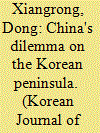

|
|
|
| 2 |
ID:
127829


|
|
|
|
|
| Publication |
2013.
|
| Summary/Abstract |
How are civilian attitudes toward combatants affected by wartime victimization? Are these effects conditional on which combatant inflicted the harm? We investigate the determinants of wartime civilian attitudes towards combatants using a survey experiment across 204 villages in five Pashtun-dominated provinces of Afghanistan-the heart of the Taliban insurgency. We use endorsement experiments to indirectly elicit truthful answers to sensitive questions about support for different combatants. We demonstrate that civilian attitudes are asymmetric in nature. Harm inflicted by the International Security Assistance Force (ISAF) is met with reduced support for ISAF and increased support for the Taliban, but Taliban-inflicted harm does not translate into greater ISAF support. We combine a multistage sampling design with hierarchical modeling to estimate ISAF and Taliban support at the individual, village, and district levels, permitting a more fine-grained analysis of wartime attitudes than previously possible.
|
|
|
|
|
|
|
|
|
|
|
|
|
|
|
|
| 3 |
ID:
162447


|
|
|
|
|
| Summary/Abstract |
With the PyeongChang Winter Olympics and Paralympics as an impetus, the two
Koreas and the United States have cast diplomatic maneuvers incessantly to devise
a peaceful solution to the North Korean nuclear issue and the Korean Peninsula
issue overall. Recently, the inter–Korean Summit and DPRK–U.S. summit resulted in
the signing of the Panmunjeom Declaration and the Joint Statement in Singapore after
talks for North Korea’s complete denuclearization and the peace regime on the Korean
Peninsula. In addition, Pyongyang declared that the byungjin line was successfully
carried out and announced that the state will focus on “economic construction.”
Nevertheless, the Kim Jong Un regime’s credibility and resolve for denuclearization are
the preconditions for peace and prosperity of the Korean Peninsula.
In this sense, this article commences with two research questions: Why has the Kim
Jong Un regime changed its economic development strategy, departing from the
previous byungjin line?; and How can we understand North Korea’s changes in a
national policy? Most of all, this paper will analyze the influence of North Korea’s
transition to an “economy-first” strategy this year on the politics of the Korean
Peninsula and discuss the South Korean government’s strategy regarding North
Korea for peace on the Korean Peninsula in the future.
|
|
|
|
|
|
|
|
|
|
|
|
|
|
|
|
| 4 |
ID:
101955
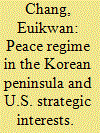

|
|
|
| 5 |
ID:
162648


|
|
|
|
|
| Summary/Abstract |
Multilateral approaches such as the Korean Peninsula Energy Development Organization, the Four-Party and Six-Party Talks, and the Trilateral Coordination and Oversight Group (established by the USA, Japan, and South Korea to solve North Korea’s issues and to build a peaceful regime on the Korean Peninsula) have achieved few accomplishments since the Cold War. Exceptions include the avoidance of deadly clashes during ongoing multilateral talks at the time of serious situations including the nuclear crisis in 1994 and the Bush administration’s attempt to strike on North Korea with nuclear weapons. The USA has hesitated to conduct kind military relationships with North Korea because they seem to strongly recognize the high risk associated with physical conflict. Additionally, the USA and its allies have experienced North Korea’s ability with nuclear weapons. Many which have attempted to target the USA during the later years of the Clinton and Bush administrations. Dealing with North Korea contributes to the knowledge of those involved in the Six-Party Talks regarding how to work with the USA and others. Are multilateral approaches still efficient under this situation? Even with a number of several types of proposals such as China’s recent dual-track approach or double suspension approach—also backed by Russia—there seems to be no certain attempt to collaborate on building a peaceful regime. This paper will examine why multilateral approaches to building a peaceful regime post Cold War on the Korean Peninsula have forwarded little to a contextual perspective of the changing regional circumstances.
|
|
|
|
|
|
|
|
|
|
|
|
|
|
|
|
| 6 |
ID:
097349
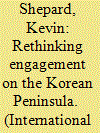

|
|
|
| 7 |
ID:
137189
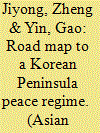

|
|
|
|
|
| Summary/Abstract |
Sustainable peace and stability need an institutional guarantee. Based on the unique logic of its Korean peninsula policy, China has sketched a Chinese-style Korean Peninsula Peace Regime that comprises logic positioning, strategic objectives and priorities, a mechanism, a timetable, and a road map. The basic logic of the peace regime, the aim of which is long-term peace and stability on the Korean peninsula, is that it should include security but also integrate security with economy and culture.
|
|
|
|
|
|
|
|
|
|
|
|
|
|
|
|
| 8 |
ID:
097347
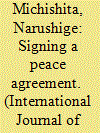

|
|
|